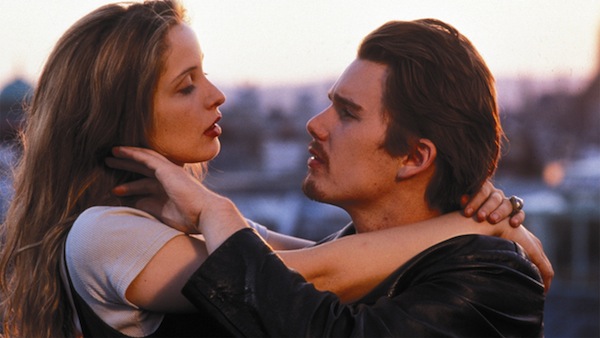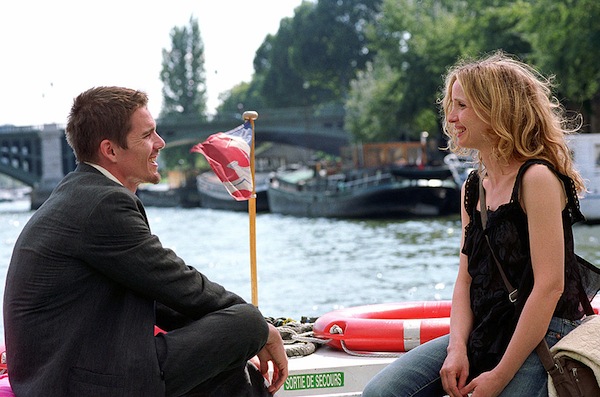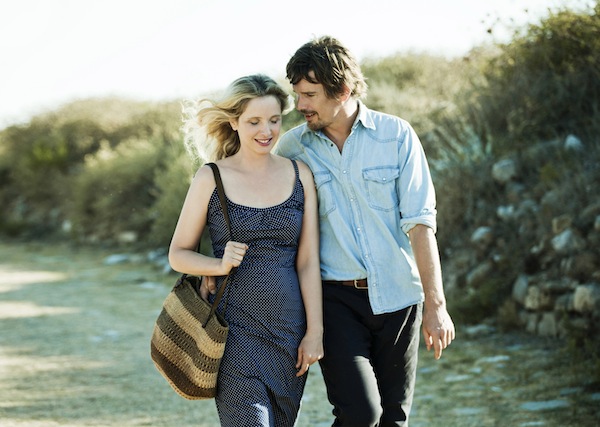Richard Linklater and Julie Delpy at A CONVERSATION WITH RICHARD LINKLATER at the 56th San Francisco International Film Festival. Photo by Pamela Gentile
Before Midnight, the collaboration between director Richard Linklater, and co-writers and actors Ethan Hawke, and Julie Delpy represents a significant cinematic achievement. Three artists at the height of their craft deliver a sequel that surpasses all that has preceded it.
In the first of the three films, Before Sunrise,(1995) Jesse, an American tourist, encounters a pretty stranger from France, Celine, aboard a train and convinces her to spend the day wondering the streets of Vienna with him; it concludes with the young lovers pledging to meet again in six months time. Nine years later, in Before Sunset,(2004) the second in the series, Celine and Jesse are reunited at Paris’ Shakespeare and Company where Jesse is signing copies of his novella inspired by that same romantic tryst, so many years before. Despite being married with a child, Jesse chooses to remain in Celine’s apartment and miss his plane home at that juncture’s close.
Before Midnight picks up nine years later yet: now in their forties, Jesse and Celine have remained together and parented twin girls; Jesse is divorced, and as their summer vacation at a writer’s retreat in Greece is drawing to a close, he bids farewell at the airport to his son Hank who is headed home to Chicago.
Before the clock strikes twelve, will tonight constitute Jesse’s and Celine’s last night for romance? Before Midnight reflects how geographic mobility and divorce complicate our lives and loves and how the art of negotiation is paramount in the preservation of our partnerships. Like the earlier films, how you interpret the journey’s end, may most accurately reflect your own sensibility and interior landscape. I suspect that Linklater’s take on love might be best surmised in the words of the Greek villa’s host Patrick, who posits that “it is not the love of one other person that is the key to happiness, it’s the love of life.”
It is a wondrous thing to watch the lead actors Ethan Hawke and Julie Delpy as they ripen in age in perfect sync with their characters, effecting for me a sort-of a fictionalized adaptation of Michael Apted’s 42 Up! The casting across the board is sublime and includes cameos from Walter Lassally (film acting debut by the Oscar-winning director of photography on Zorba the Greek, Patrick), Xenia Kalogeropoulou (Natalia), Athina Rachel Tsangara (Ariadni) and Panos Koronis (Stefanos).
Before Sunset was nominated for an Academy Award for Best Original Screenplay. For a ride that is alternatively witty, profound, biting and bittersweet, I believe that it is likely that Before Midnight may be accorded similar recognition. Linklater deserves a nod, moreover, for his feat in directing, which is seamless and artful.
The following has been excerpted and edited from “A Conversation with Richard Linklater” and Q&A with Linklater and Delpy just following the screening of Before Midnight, on closing night of the 56th San Francisco International Film Festival.
Regarding Before Sunrise
Richard Linklater: The first film, Before Sunrise, was kind of conventional. It was just about two people falling in love with each other … however you want to define that. There was a script, but it was always my goal to cast the two most creative actors that I could find and have them bring themselves to it. Hooking up with Ethan and Julie and their creative talent was such an important moment in my life.
Julie Delpy: I really liked the original screenplay for Before Sunrise. It was very intellectual. The characters talked a lot and expressed all their thoughts. I had been writing screenplays and not getting anything made, so I was a bit frustrated as a writer; collaborating with Richard and Ethan was a way to get my stuff in there. We rewrote Before Sunrise all together for at least three weeks in Vienna and throughout the shoot.
RL: I knew that if we did Before Sunrise word for word as scripted (even though the actors all liked the screenplay), it would suck as a movie. I fired “the writer” (even though I was the writer), and let the director take over — which meant it became all about the actors. I remember Ethan, Julie and I all sitting in this room in Vienna; we were really all just getting to know each other, with the script as a jumping off point. In the workshop process, you have an overall goal for a scene, but we’re just pouring out information and being very honest with each other. We push each other, challenge each other, and are very respectful of each other. We’re free-associating. Julie will say something really outrageous — she’s just trying to entertain us, and we’re like, “No, that should be in the movie!” In Before Sunrise, there was a placeholder for a scene – ‘Scene Where Their Relationship Goes to a New Level.’ Somewhere along the way, Julie talked about this game she played.
JD: Pretending to be on the phone with a girlfriend of mine. I think it’s a good way to say what you feel without directly saying it.
RL: Which was perfect indirect-direct communication, at this point in Celine and Jesse’s relationship.
JD: It doesn’t always work in life. But it works in the film.
RL: For something to end up in one of these movies, it has to be vetted through all three of us. So much of collaboration, you try not to hurt peoples’ feelings, you try to be polite. We have a shorthand, if you look up and they’re going – “hmmm… “ Well then, we just move onto another idea.
JD: There are many things. Jokes, dirty jokes, silly things, profound things – I start crying. And they’re like “Great, when you cry.” (But I’m crying for real, I’m a person too! They don’t care; I’m just there for serving the purpose. — No, I’m joking.) It’s like digging in a coal mine and finding a diamond.
RL: The first film, the characters were on the page and the actors were rewriting and melding what was on the page, trying to make that work, where for the subsequent two films, from the beginning, the actors were writers with me. We all write for all the characters.
JD: On Before Sunset, when Jesse tells Celine something to the effect that she will be a great mother on anti-depressants, a friend of mine protested, “Oh my god, that’s so condescending, how could you let this line go in the film?” “What are you talking about, I wrote it for him!,” I confessed.
RL: Usually the lines that are the most out there, are criticisms that we have been told about ourselves. It’s not us criticizing each other; it’s us pulling in crazy things that we’ve heard.
JD: It’s kind of fun to write the insult that the other person uses against you.
RL: Ethan is very good at that. He is a brutally honest artist. He will go all the way with an idea, and he really doesn’t care how he comes off. Ethan has no vanity in that way.
JD: When we write these films, we analyze every word and motive. There’s not a word in these films that is an accident because the way we work, we will pick at it until we drive ourselves crazy. We don’t improvise anything. We approach it as writers. In the script, it’s all about the architecture of the storytelling.
Regarding Before Sunset
RL: To make the second film, Before Sunset, was the big leap. Nobody was clamoring for a sequel except ultimately, the three of us. The joke about Before Sunrise was, “It’s the lowest grossing film to ever spawn a sequel!” That was a critical moment for us creatively because if we messed up the second film, we risked what was special about that first one. In 1999, Julie and Ethan did a scene in Waking Life together. We looked at each other and said, “Hey, we should do that sequel, we’ve been joking about. That was the five year point.
JD: I was reminded how great working together was. When you’re young, you think you are going to encounter many great collaborators; you expect it is going to happen often, but then you realize it is probably something that happens with very, very few people in your life. Richard, Ethan and I — we have that, and it is pretty rare.
RL: We create obstacles for ourselves. Before Sunset was a challenge because we decided to make it in real time. Like a play, there was nothing that could be cut out. The takes were longer.
JD: I think the idea for the approach for Before Sunset started with a joke I made: “Let’s make a sex scene in real time!” (Not actually “fucking,” because that’s almost too easy.) A real-time, take your time with it, sex scene.
RL: The experience on Before Sunset emboldened us stylistically for the third picture with even longer takes. Every film you set some goals that make it almost impossible. There’s always something insurmountable.
Regarding Before Midnight
JD: Part of our work every time is to think what exactly happened in those past nine years. What have you been through, what have you achieved professionally, what were your relationships, how did you break up with your last boyfriend, how did you feel? We don’t do that in the room. We do that over those couple of years before actually writing the script.
JD: We start around the seven-year mark.
RL: These films are unique in that we have this gestation time. We have all lived 19 more years now. We have eight kids between the three of us now. We’ve been through a lot. All that is fodder. Much of our time spent together is just talking about how things go in our own lives. We are all bringing our life experience to the story.
JD: Every film is more challenging. It’s not an obvious, crowd-pleasing thing. Even though it is very real, it’s not like cute and flirty anymore.
RL: I’ve always viewed [romance] as a pretty conflicted subject … in life. Not just in my life, but in history — if you look back hundreds of years, writers were talking about unhappiness. To hitch your wagon to a romantic partner or to put too much into romantic love or anything that you can’t possess (i.e. another person), you will be necessarily unhappy, emotionally unstable, and vulnerable. Spinoza talks about it. It goes way back.
JD: It seems like the most romantic ideas throughout most of history, were that people would fall in love and kill themselves — until Disney showed up and romance ended up happy ever after (but that’s pretty new).
RL: But we were trying to be somewhat realistic.
JD: All those romantic comedies. They’re extremely anti-feminist. Two people meet, they struggle getting together, they end up together, and then they don’t have anything in common. She just wants to get married. I don’t know. It’s really depressing to me. The forties were better — Katherine Hepburn. But then the eighties got back into that regressive mode …
RL: What about the current state? Nora Ephron, Nancy Meyers – they make films from very much a female point of view.
JD: Don’t women always want to get married at the end? I mean, not that I’m against marriage; I am for it … for the gays ONLY!
RL: With Before Midnight, we still felt it was romantic in some way. It’s not anti-romantic. It’s just as you get older, the definition of romance shifts around a little bit. They are still talking, they are still communicating, making each other laugh. It couldn’t be an encounter. We had to see them in their lives, and that includes other people.
JD: The other characters mirror them in different ways. The young couple, what they would have been if they had met now with technology. The other mid-life couple was a different dynamic. And the older widow and widower.
RL: It was fun to show how you would deal with your feelings about your own relationship in your social self, which is very different than your private self. You can sometimes say things and not be held to account so much. Tell jokes that aren’t really jokes. We find Celine and Jesse in some sort of paradise in Greece. They had gotten so much of what they had probably wanted in the world; if you could go back, they probably would have signed on for this kind of life. Really this is a good scenario for them, and yet … they are still negotiating. It was a nice jumping off point for the story. The hotel room scene is almost a mini-movie. I remember trying to reflect how arguments really happen — how they start early and kind of go on forever, and don’t ever quite finish.
JD: It’s like an ideal argument, our dream argument. Everyone who is alive has had an argument. You go places in an argument that sometimes you regret a half-an-hour later. I think no one can exasperate you more than the person you live with or the person you love, at times. The thing is Celine is really pissed off about that thing that Jesse has planted about wanting to move to Chicago to be near his son because she knows where this is going.
RL: He’s manipulating her for sure. She’s manipulating him. Two intelligent, master manipulators going at it.
JD: If Celine doesn’t fight back as fiercely as possible, she will end up moving. She is a very strong person, who will not let someone destroy her life. It’s actually very risky subject matter – a couple fighting.
RL: Jesse and Celine really fit into statistical norms in so many ways of people of their generation. There’s nothing extraordinary about them, so I think all we offer is some kind of a heightened honesty about where they find themselves. We were also trying to show that if you do stick it out, it’s more of a triumph in a way, of your own development or your own spirit. You can see what is great about the stage of life that you are in. You are not missing your earlier selves. You wouldn’t want to go back there. It’s more of a challenge to find romance and life interesting at this age. It’s kind of a hard-earned romance, I guess, or harder earned optimism. But that’s how life is, to me — it’s more of a challenge in certain ways.
Where can you see Before Midnight? Find out here.
Top: Richard Linklater and Julie Delpy at A CONVERSATION WITH RICHARD LINKLATER at the 56th San Francisco International Film Festival. Photo by Pamela Gentile



